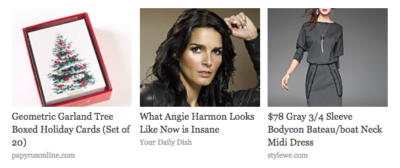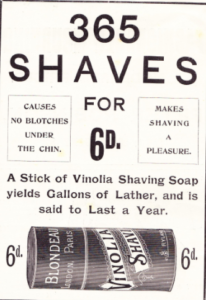Pssst. Wanna buy some junk?
When it was announced that Verizon was buying AOL, the NY Times had several articles about the purchase. They made it clear that the only reason anyone would want to buy AOL is because of their advertising know-how.
By layering AOL’s technology atop its 109 million wireless connections and growing cable television business, Verizon is betting that it can make billions of dollars by selling ads against streaming video.
Oh great! Does that mean that Verizon is going to try to make me watch more ads? Looks like I’ll have to find a new phone service. How did we get to the point where people think it’s normal to make money from advertising?

I grew up watching the BBC and listening to Radio 1, neither of which carry any advertising. ITV had a few good programs but, even to a seven year old, watching anything with ads felt a little bit shabby. It was all shouting carpet salesmen and you-won’t-believe-how-great-this-salad-chopper-works plastic Ronco junk.
About one in a hundred ads was laugh-out-loud funny (“Heineken refreshes the parts other beers can’t reach”; “Then we smash them all to bits! For mash get Smaaaash!”) or made with such a fine artistic sensibility that you wanted to watch them over and over (Stella Artois—Reassuringly Expensive; Ruddles — Oooh! — Real Ale!).
Coming to America meant leaving quality advertising behind. It’s hard to comprehend until you get here just how much you are bombarded with advertising and, of course, Americans like to show all five of their well-made adverts on the same day in January. For the rest of the year it’s just dodgy loan companies reading their small print and razors with one more blade than the competition. Commercial radio is completely unlistenable. You are not even safe on NPR.

It’s weird to me that people still accept this soul-destroying barrage of dross as though it were a normal thing.
Fortunately, I live in a time where it has again become possible to escape the vulgar marketplace and pay for the things I like instead of watching the crap that advertisers want me to watch. I can pay $10 for HBO without also paying for QVC. I can listen to the best radio stations on the planet for $4 a month (Pandora) with no annoying DJs or mattress salesmen. The Economist, Netflix, Rdio—these are all great services that I am delighted to pay for to stay out of the awful, awful cesspool of free, so-called commercial services.

Jeremy Paxman tells me that he doesn’t think the BBC licence fee will last much longer. I hope, if he’s right, the BBC figures out how to sell its programs to me directly. I’ll pay gladly.

I sometimes wonder if advertising was just a temporary blip in human culture. Before 20th century mass-media, products were recommended by word-of-mouth. The Internet has made word-of-mouth scaleable enough to be viable again. Perhaps we’ll be rid of mass-market advertising in the 21st century? I hope so… with a couple of caveats.

Point-of-sale advertising was around long before the 20th century and still makes a lot of sense. If I buy a flight to London and you offer me a car rental or a hotel, there’s a good chance I’ll take it. Similarly, if I am searching for a restaurant and you tell me about the wonderful tapas bar in the next street, I’ll be glad of the tip. But, honestly, spamming my inbox with cheap flights to London—after I already bought my flight, mind!—is just going to annoy me.

I’d also be delighted if advertisers would figure out how to get my attention with high-quality adverts. I don’t promise to buy your products, but I will watch your ads if they are entertaining. Luckily for me it is getting easier to avoid them if they are not.
